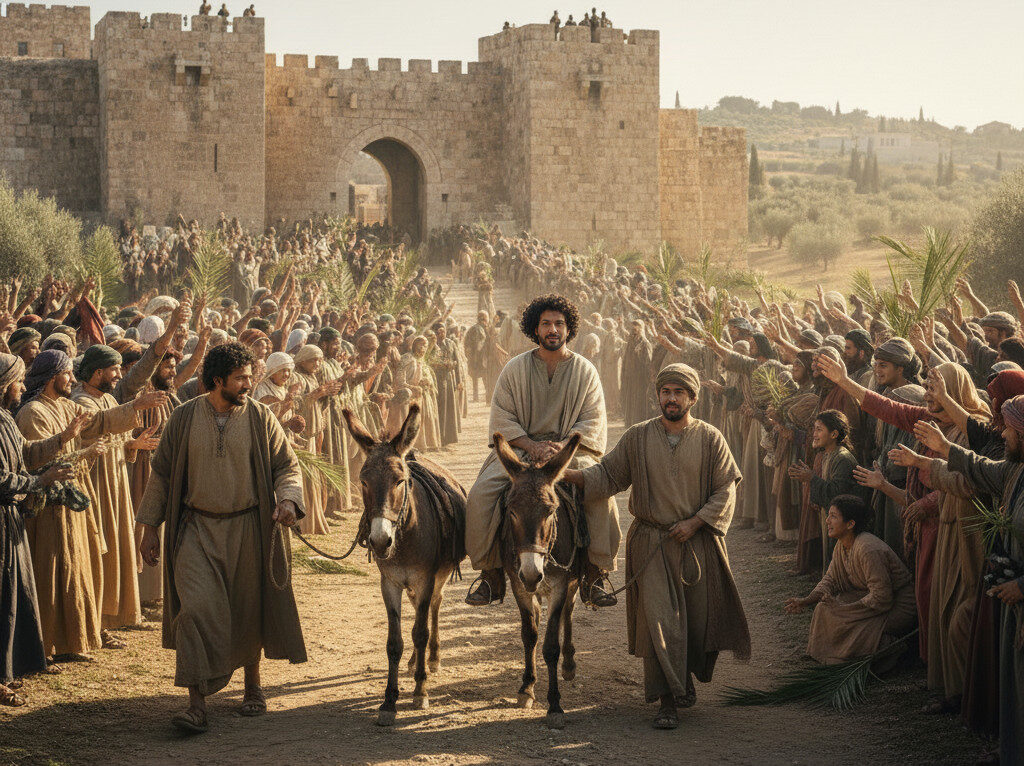Ezekiel 37:15-28 and Elements of God’s Future Promises to Israel
By Dr. Keith Kobelia / January 30, 2026
The Prophet Ezekiel was called to an unusual but important ministry to the captives of Judah in Babylon. Despite his unusual methods (e.g., symbolic acts) and extraordinary visions (e.g., Ezek...
Read More
Why the Promises to Israel Matter Today
By Dr. Daniel Brown / November 15, 2025
Fulfilled Messianic Prophecies from the Book of Zechariah
By Dr. Keith Kobelia / September 15, 2025
Among the most intriguing prophetic sections of the Bible are the prophecies of Zechariah which are contained in the book that bears his name. Zechariah is teeming with Messianic prophecies,...
Read More
The Virgin in Isaiah 7:14
By Dr. Timothy A. Little / July 1, 2025
INTRODUCTION According to the Gospel of Matthew, the virgin Mary was found to be with child of the Holy Spirit. Jesus the Messiah was miraculously conceived, and, several months later,...
Read More
1 Reply
{"slides_column":1,"slides_scroll":1,"dots":"true","arrows":"true","autoplay":"true","autoplay_interval":"5000","speed":"1200","lazyload":""}
The New Spirituality
Posted on by Dr. James Maxwell, III
Like many false teachings, The New Spirituality uses Christian terms and practices but infuses into them meanings far different from what we find in Scripture. Even some evangelicals have embraced various forms and teachings of this movement. In this article Dr. James D. Maxwell III, the president of Faith Baptist Bible College and Seminary, exposes the dangers of The New Spirituality and offers suggestions for how believers should respond to it.
What Is The New Spirituality?
The New Spirituality as a paradigm for devotion and spiritual formation that utilizes forms and approaches originating from the Bible and from traditions and sources other than the Bible.
The Heart and Hands of Leadership
Posted on by Dr. John Hartog, III
Leadership is always a subject of prime importance for the local church. The spiritual success of a church is in direct proportion to the quality of its leaders. In this article Dr. John Hartog III, professor at Faith Baptist Theological Seminary in Ankeny, Iowa, explores Psalm 78 to discover several qualities of leadership from David’s life.
Israel’s History from Zoan to Zion
Psalm 78 is the first and longest of the Historical psalms (the others are 105, 106, and 135).1 Only Psalm 119 is longer than Psalm 78.
The Christian Education Committee in a Local Church
Posted on by Mr. Don Anderson
A church’s Christian education program is a large part of its overall ministry. It involves more people and more programs than any other part of a church’s life. How can a pastor effectively organize and coordinate the different parts of the Christian education program? By utilizing a Christian Education Committee. In this issue of Faith Pulpit Don Anderson, professor of Christian Education at Faith Baptist Bible College, explains the value and function of the Christian Education Committee.
Christian education is an important part of a church’s ministry.
The “New Perspective” and Justification, Part 2
Posted on by Dr. Paul Hartog
In the July/August edition of the Faith Pulpit, Dr. Paul Hartog of Faith Baptist Theological Seminary compared two facets of the “New Perspective” on justification with a Dispensational point of view. He focused on N. T. Wright’s treatment of the gospel and the righteousness of God. (You may access that issue at faith.edu/seminary.) In this issue he analyzes three additional facets of Wright’s “new perspective”-the final judgment according to works, the ordo salutis, and justification.
The Final Judgment according to Works
Wright maintains that “Paul, in company with mainstream Second Temple Judaism, affirms that God’s final judgment will be in accordance with the entirety of a life led—in accordance, in other words, with works” (253).1 Wright’s primary evidence for a general judgment based upon works is found in Romans 2:1-16, although he also argues from Romans 14:10-12, 1 Corinthians 3, and 2 Corinthians 5:10 (253).
The “New Perspective” and Justification, Part 1
Posted on by Dr. Paul Hartog
In the past few years some men have begun rethinking major issues of the Christian faith. Their thoughts and conclusions on a variety of subjects have been commonly called the “New Perspective.” In Part 1 of his article, Dr. Paul Hartog of Faith Baptist Bible College and Theological Seminary carefully compares two facets of the “New Perspective” on justification with a Dispensational point of view. He will complete his analysis in the September/October issue of Faith Pulpit.
In his 1982 Manson Memorial Lecture at the University of Manchester, J.
The Emerging Church: The New Worldly Church
Posted on by Dr. Douglas Brown
What are we to think of the emerging church movement? Does it have any validity? What are its dangers? In this issue of the Faith Pulpit, Dr. Douglas Brown of Faith Baptist Theological Seminary combines careful analysis with Biblical understanding to show us the hazards of this movement and how to help people avoid being enticed by it.
The emerging church (or emergent church) is an elusive movement.1 Attempting to understand and explain the emerging church is admittedly difficult. However, the movement is impacting the church today and needs our attention.
A Critique of “Easy Believism”
Posted on by Dr. Myron J. Houghton
What constitutes saving faith? Is it intellectual assent or something more? These questions go right to the core of the gospel message. In this issue of the Faith Pulpit, Dr. Myron Houghton of Faith Baptist Theological Seminary speaks to this important matter with careful Biblical thinking.
“Easy believism,” as I am using this term, refers to a position held by those who define saving faith purely as intellectual agreement with the statement, “Jesus is the Son of God, and He promises eternal life to all who believe in Him.”
The Call to the Ministry
Posted on by Dr. Douglas Brown
Does God call people to the ministry, or is it one of several career paths a Christian can choose? Pastors and church leaders need to be clear about this vital issue. In this article Dr. Douglas Brown of Faith Baptist Theological Seminary addresses this important question with Biblical answers.
The gospel ministry is a high and noble calling. In 2 Corinthians 3:7–11 Paul proclaimed that the ministry is glorious. In 1 Timothy 3:1 Paul declared that pastoral ministry is a ”good”, or honorable, work (kalou ergou).
The Preacher and His Library, Part 2
Posted on by Dr. Ernie Schmidt
How to Build a Library
As you work toward building a library of your own, consider borrowing books from a fellow pastor or people in your congregation. If you do, be sure to follow the ethics of borrowing: always treat a borrowed book better than your own, and do not mark in a borrowed book unless the lender specifically gives permission to do so. You will also find college or university libraries a helpful resource for borrowed materials. Such libraries do not have to be part of a Bible college or seminary to have theological volumes.
The Preacher and His Library, Part 1
Posted on by Dr. Ernie Schmidt
“And the books, but especially the parchments . . .” II Timothy 4:13
Introduction
While no one knows for sure what Paul was requesting when he talked about the books and the parchments, it is probable that he was asking for a copy of the Old Testament, or at least for part of it. Even in his final days of life, Paul was a reader. Since the days of the apostle Paul, reading has been part of the lifestyle of preachers.



